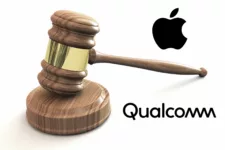Today the Japan Fair Trade Commission reversed their 2009 cease-and-desist order for licensing in Japan indicating that Qualcomm’s licensing model did not violate Japanese antimonopoly law. This early move by Japan provided a great deal of the foundation for Apple’s attack on Qualcomm’s business model and now that it has been reversed the legal justification for that attack has seemed to evaporate.
This entire effort has been increasingly spinning against Apple who has obviously been the aggressor in their actions to cripple far smaller and weaker Qualcomm. Increasingly these actions by Apple to cripple Qualcomm have appeared to be founded in a belief that if Apple could get to Google through Qualcomm by crippling the hardware that runs Android. By crippling Qualcomm after Apple failed in their attempt to halt Google from supporting a competing Smartphone platform to the iPhone. It is with some extreme irony that Apple’s claims that Qualcomm was limiting competition actually appear to have concealed a far more potent challenge against broad competition. Apple would have substantially damaged most every competitor they had in market but instead this likely has contributed more to their own market share declines which could now accelerate substantially because Apple is massively out of position with 5G.
Let’s revisit Apple’s strategy here and talk about why it is flawed.
Apple vs. Google
This conflict now appears to go back to Steve Jobs’ seemingly accurate claim that Google, while their then CEO sat on Apple’s board, used this trusted position to violate that trust and create a competing Smartphone product. Jobs felt so strongly that Google’s founders, who he personally mentored, had violated his trust to undercut the iPhone with a more successful, in terms of volume but not profit, effort.
Apple’s direct attacks on Google failed because Google both had more than adequate resources to defend against Apple and vastly more market power due to their near dominant position in Internet advertising and information. Instead of rolling over Google and Android, Apple was repulsed forcing them to come up with a Plan “B.”
That plan appears to have been to go after Qualcomm because if they could cripple Qualcomm’s R&D efforts, which largely found Smartphone advancements, Apple could in theory significantly outperform Android hardware. Unlike Google which is arguably stronger than Apple, Qualcomm is far weaker, and Apple’s efforts were designed to eliminate much of Qualcomm’s revenue, use the resulting collapse of their valuation to cause a hostile takeover by Broadcom who then would destroy Qualcomm. The only reason this didn’t work is that Tim Cook didn’t get the support of Donald Trump who personally came to Qualcomm’s defense pronouncing that the firm was a National Treasure.
Since then the tide has slowly, but clearly, moved in Qualcomm’s favor as China and Germany (Apple has since conceded to Qualcomm) blocked sales of Apple products and, most recently, Japan reversed their position that Qualcomm had violated Japan’s antimonopoly law.
Since Apple began this strategy, they have failed to launch a hit product, their Smartphone market share has gone into decline and, most recently, their iPhone sales volume has gone into decline. Currently they are largely only able to show revenue increases by raising prices which is a sure indicator that Apple is likely violating anti-trust laws since is shows a lack of competitive pressure on prices and the effects of customer lock in (something that anti-trust organizations tend to object to). And the visibility of this increasing weakness likely helped support the decision for Spotify to bring their own anti-trust action against Apple. (What appears ironic here is that Spotify appears to be using many of Apple’s arguments against Qualcomm against Apple itself highlighting the dual edged sword that litigation like this can become).
While this strategy to use Qualcomm as a proxy for Google was inspired and likely would have even worked if the Trump Administration hadn’t stepped in, it is now failing and needs to be rethought before it massively weakens Apple. In general, litigation as an offensive weapon, fails because CEOs just don’t understand it. They particularly don’t understand that their own arguments can be turned against them very effectively, something I think Spotify is now going to demonstrate.
Wrapping Up: Apple Needs New Leadership
Tim Cook, given he was selected by Steve Jobs to fail (Jobs didn’t believe he was going to die and wanted his CEO job back) has done an impressive job. But, as a Logistics expert, he was always a bad choice for Apple which had been transformed into a marketing powerhouse by Steve Jobs. Currently Tim appears to be trying to restructure Apple to be more like Compaq was forgetting Compaq operated with vastly reduced margins and a fraction of Apple’s current valuation even at their peak. The litigation against both Google and Apple not only has mostly failed at this point despite the fact that Apple has one of, if not the strongest legal team in the market, it has also created a huge distraction for Apple’s board and executive team who appears to have completely missed that Apple’s ability to bring out hit products has all but evaporated.
During this time they killed Steve Jobs incredibly successful naming methodology going from iProducts to Homepod and Apple Watch, they have significantly reduced the effectiveness and apparent budget behind Apple’s once market leading demand generation marketing efforts, their offerings have been over cost reduced to become uncompetitive, and they seem to not know what to do to reverse these trends. That’s a leadership problem and if Apple’s board doesn’t fix this soon the firm’s decline may again, like it did before Steve Jobs’ return in the 1990s, appear unstoppable.
One final comment, the use of litigation as an offensive, rather than defensive, weapon has generally proven unreliable largely because CEOs just aren’t expert enough with this form of combat to be effective. When a CEO, after failing to compete in market (recall Apple was once dominant in the Smartphone space), turns to a battlefield they don’t know as well it is typically time to find a new CEO. I think we’ve entered that phase and I doubt the Apple board has missed this event (certainly some Apple followers haven’t).








